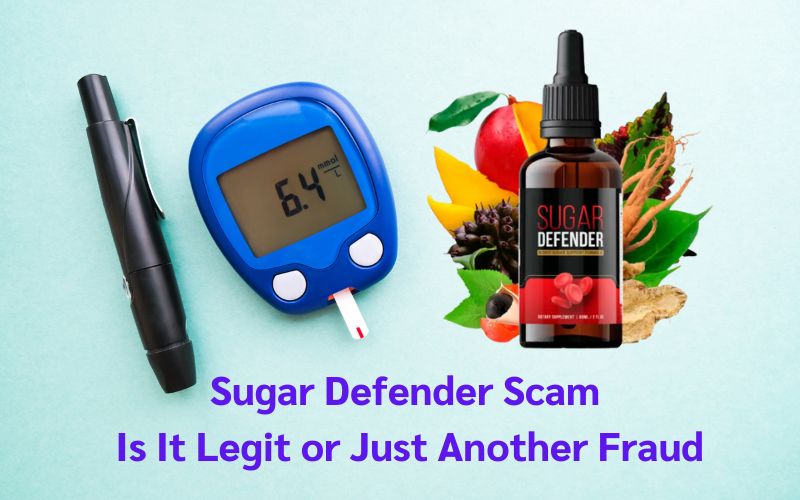In recent years, the dietary supplement industry has seen a surge in products claiming to offer solutions for various health issues, including diabetes management. One such product that has garnered attention is Sugar Defender. With increasing popularity, questions have naturally arisen about its legitimacy. In this article, we delve into the topic, focusing on the keyword “Sugar Defender scam” and its associated phrases: “is Sugar Defender a scam,” “Sugar Defender scam or legit,” and “is Sugar Defender legit.”
Table of Contents
Understanding Sugar Defender
Before jumping into whether Sugar Defender is a scam, it’s crucial to understand what this product is designed to do. Sugar Defender is marketed as a natural supplement aimed at helping individuals manage their blood sugar levels. It contains a blend of ingredients known for their potential benefits in supporting healthy glucose metabolism, such as bitter melon, cinnamon extract, and chromium. These ingredients are chosen for their roles in promoting insulin sensitivity and overall blood sugar regulation.
The Origins of the “Sugar Defender Scam” Concern
The term “Sugar Defender scam” seems to have surfaced primarily due to the typical skepticism surrounding supplements, especially those targeting serious health conditions like diabetes. When a product promises significant health benefits, it’s natural for potential users to question its authenticity and effectiveness. The internet is rife with misinformation, making it easy for rumors to spread, particularly if a product is new or gaining rapid popularity.
Is Sugar Defender a Scam or Legit?
When evaluating whether Sugar Defender is a scam or legit, it’s essential to consider several factors:
1. Ingredients and Their Efficacy
The legitimacy of any supplement largely depends on its ingredients and the scientific backing behind them. As mentioned, Sugar Defender contains ingredients that have been studied for their potential effects on blood sugar levels. For instance:
- Bitter Melon: Known to have insulin-mimicking properties, potentially helping lower blood sugar.
- Cinnamon Extract: Research suggests that cinnamon can improve insulin sensitivity and regulate blood sugar spikes.
- Chromium: A trace mineral essential for carbohydrate metabolism and known to enhance insulin action.
The inclusion of these ingredients suggests that Sugar Defender is formulated based on scientific evidence, which lends credibility to its claims.
2. Manufacturer Reputation
Another critical aspect of determining whether Sugar Defender is a scam or legit is the reputation of the manufacturer. Consumers should look for information about the company, including how long it has been in business, its transparency about ingredient sourcing, and whether it complies with Good Manufacturing Practices (GMP). A company that is open about its manufacturing processes and adheres to regulatory standards is more likely to offer a legitimate product.
3. User Experiences and Testimonials
Customer reviews and testimonials are powerful indicators of a product’s legitimacy. Sugar Defender reviews available online show a mix of experiences, which is common with any health supplement. However, the majority of reviews indicate positive outcomes, with users reporting better blood sugar management and increased energy levels. While individual experiences may vary, a pattern of positive feedback can help dispel concerns about a Sugar Defender scam.
Sugar Defender Scam or Legit: Red Flags to Watch Out For
While Sugar Defender itself may not be a scam, there are potential red flags to be aware of when purchasing any supplement:
- Fake Websites: Be cautious of counterfeit websites selling Sugar Defender at unusually low prices. These sites often do not deliver the product or provide a substandard version.
- Unauthorized Sellers: Purchasing from unauthorized sellers can also lead to receiving a fake product. It’s advisable to buy Sugar Defender directly from the official website or authorized retailers to ensure authenticity.
- Exaggerated Claims: Be wary of exaggerated health claims not supported by scientific evidence. Legitimate supplements will acknowledge that while their products may support health, they are not cures or replacements for prescribed medication.
Visit the official Sugar Defender website here
How to Determine If Sugar Defender Is Legit
To confirm whether Sugar Defender is legit, consider the following steps:
- Research the Product: Investigate the ingredients and read scientific studies related to them. Understanding what each component does can provide insight into the product’s potential effectiveness.
- Check the Manufacturer’s Credentials: A reputable manufacturer will have a solid track record and provide clear information about their products.
- Read User Reviews: Look at both positive and negative reviews to get a balanced view of what to expect.
- Consult a Healthcare Professional: Before taking any supplement, especially for managing a condition like diabetes, consult with a healthcare professional to ensure it’s appropriate for your needs.

Conclusion: Is Sugar Defender a Scam?
After a thorough examination, it appears that Sugar Defender is not a scam but rather a legitimate dietary supplement formulated with scientifically-backed ingredients known to support blood sugar management. However, as with any supplement, results can vary based on individual health conditions, lifestyle, and adherence to usage instructions.
For those considering Sugar Defender, it’s important to purchase from reputable sources and to set realistic expectations regarding its benefits. If you’re interested in learning more about this product, reading more in-depth reviews, or making a purchase, it’s recommended to visit the official Sugar Defender website.
In conclusion, while the term “Sugar Defender scam” may raise alarms, a careful evaluation suggests that Sugar Defender is a legitimate product that could be beneficial for those looking to support their diabetes management naturally.
Read More:
Sugar Defender Review: 5 Powerful Benefits in Diabetes Control
Sugar Defender Reviews and Complaints: What You Need to Know
